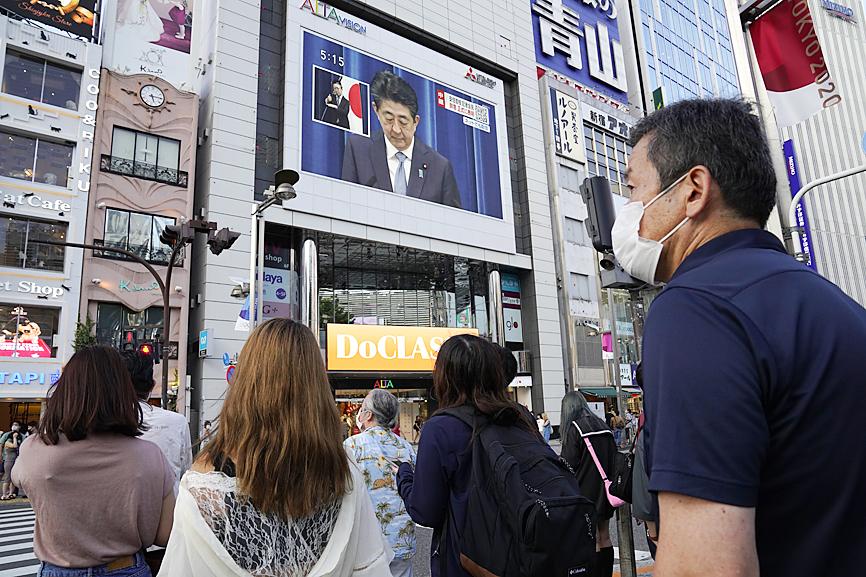The race to succeed Japanese Prime Minister Shinzo Abe started informally yesterday, with several contenders announcing their plans to stand, a day after Japan’s longest-serving leader announced his resignation.
Abe said he was experiencing a recurrence of ulcerative colitis, the condition that forced him to cut short his first term in office, but that he would stay on until his successor is decided.
Exactly how the process would unfold was still unclear, with local media reporting that several options were being considered.

Photo: EPA-EFE
Abe’s ruling Liberal Democratic Party (LDP) could opt for a more traditional leadership election, involving lawmakers but also members of the party nationwide.
The LDP would choose Abe’s successor on about Sept. 15, Kyodo news agency reported.
However, the urgency of the situation, as well as the constraints imposed by the COVID-19 pandemic, could see the party instead opt to poll only its lawmakers and regional representatives — a faster process.
A few would-be candidates have thrown their hats into the ring, including party policy chief Fumio Kishida, a mild-mannered former minister of foreign affairs considered Abe’s personal choice for successor, and former minister of defense Shigeru Ishiba, who is seen as more popular with voters, but commands less party support than some other candidates.
Japanese Minister of Finance Taro Aso, himself a former prime minister and long considered a likely successor to Abe, has announced that he would not stand.
Other possible candidates include powerful Japanese Chief Cabinet Secretary Yoshihide Suga, viewed by many as a frontrunner, and Japanese Minister of Defense Taro Kono, a social-media-savvy former foreign minister who is seen as something of a long shot.
One woman is among those expected to stand so far: Seiko Noda, a former Cabinet minister whose chances are thought to be slim.
Whoever comes out on top, little major shift in policy is expected, analysts have said.
“Key policies — diplomacy and economic measures — won’t be changed drastically,” Shinichi Nishikawa, a professor of political science at Meiji University in Tokyo, told reporters.
“His successor could be a caretaker,” Nishikawa added, given that the LDP is to hold another leadership election in September next year, with general elections likely the following month.
Additional reporting by Reuters

The Taiwanese passport ranked 33rd in a global listing of passports by convenience this month, rising three places from last month’s ranking, but matching its position in January last year. The Henley Passport Index, an international ranking of passports by the number of designations its holder can travel to without a visa, showed that the Taiwan passport enables holders to travel to 139 countries and territories without a visa. Singapore’s passport was ranked the most powerful with visa-free access to 192 destinations out of 227, according to the index published on Tuesday by UK-based migration investment consultancy firm Henley and Partners. Japan’s and

NATIONAL SECURITY THREAT: An official said that Guan Guan’s comments had gone beyond the threshold of free speech, as she advocated for the destruction of the ROC China-born media influencer Guan Guan’s (關關) residency permit has been revoked for repeatedly posting pro-China content that threatens national security, the National Immigration Agency said yesterday. Guan Guan has said many controversial things in her videos posted to Douyin (抖音), including “the red flag will soon be painted all over Taiwan” and “Taiwan is an inseparable part of China,” while expressing hope for expedited “reunification.” The agency received multiple reports alleging that Guan Guan had advocated for armed reunification last year. After investigating, the agency last month issued a notice requiring her to appear and account for her actions. Guan Guan appeared as required,

Japan and the Philippines yesterday signed a defense pact that would allow the tax-free provision of ammunition, fuel, food and other necessities when their forces stage joint training to boost deterrence against China’s growing aggression in the region and to bolster their preparation for natural disasters. Japan has faced increasing political, trade and security tensions with China, which was angered by Japanese Prime Minister Sanae Takaichi’s remark that a Chinese attack on Taiwan would be a survival-threatening situation for Japan, triggering a military response. Japan and the Philippines have also had separate territorial conflicts with Beijing in the East and South China

A strong cold air mass is expected to arrive tonight, bringing a change in weather and a drop in temperature, the Central Weather Administration (CWA) said. The coldest time would be early on Thursday morning, with temperatures in some areas dipping as low as 8°C, it said. Daytime highs yesterday were 22°C to 24°C in northern and eastern Taiwan, and about 25°C to 28°C in the central and southern regions, it said. However, nighttime lows would dip to about 15°C to 16°C in central and northern Taiwan as well as the northeast, and 17°C to 19°C elsewhere, it said. Tropical Storm Nokaen, currently